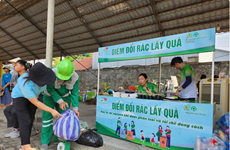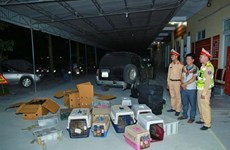Ministry plans to increase environmental protection tax on non-biodegradable packaging
Expanding the tax base and increasing environmental protection tax on non-biodegradable packaging materials would be considered with an aim to limit the use of these materials.
 Illustrative image (Photo: VNA)
Illustrative image (Photo: VNA) The proposal was included in the draft report by the Ministry of Justice about the law-making programme of the 15th National Assembly.
Accordingly, besides plastic bags which were already subject to the environmental protection tax, styrofoam boxes used for packaging food would be added as subject to this tax under the common name of “non-biodegradable packaging materials”.
The tax rate would also be increased to be equivalent to the rates of countries around the world, aiming to limit the use of plastic bags and styrofoam boxes.
The ministry pointed out that many countries in the world imposed high environmental protection tax on plastic bags and even banned the production, sale and use of plastic bags.
Vietnam was one of the countries using the most plastic bags, with an average of 1kg per month per household, according to the ministry.
In two major cities, Hanoi and Ho Chi Minh City, about 80 million tonnes of plastic products and plastic bags were dumped into the environment every day, most of which are non-biodegradable.
Like other countries, Vietnam used environmental protection tax as one of the most important tools to reduce the use of plastic bags with a rate of 50,000 VND per kg, which remained low compared to other countries.
In addition, the collection of environmental protection tax on plastic bags remained modest.
With such huge consumption of plastic bags, Vietnam should have been collecting dozens of trillions of đồng in environmental protection tax on plastic bags but in fact, the country could collect only around 70 billion VND per year – this was too small to change the production and consumption habits towards this product.
“Expanding tax base and increasing environmental protection tax are necessary to prevent white pollution,” the ministry said, adding that the increase must be put into careful consideration.
According to Tran Hong Tinh from the Hanoi Bar Association, policymakers should consider imposing a tax based on the number of plastic bags and boxes rather than on volume.
This would prevent the production and use of thin plastic bags.
“As costs rise, retailers are forced to seriously consider how many free bags they give out to their customers or ask consumers to share the cost. Only in this way, can we hope to change the habit of using plastic bags and boxes which is causing serious environmental impacts,” Tinh said.
According to a study by the University of Science, Viertnam National University, Hanoi, around 2.5 million tonnes of plastics and plastic bags were discarded in Vietnam in 2020, most of which were styrofoam boxes, plastic bags and straws. Notably, only 10% was recycled and reused.
The COVID-19 pandemic caused a spike in plastic waste in recent years along with the boom of e-commerce and food delivery services.
Nguyen Huy Nga, Director of the Centre for Health Environment Research and Development, said that to reduce plastic waste and pollution, each person must be conscious of not using single-use plastic products.
Kim Thuy Ngoc from the Institute of Strategy and Policy on Natural Resources and Environment, said that raising taxes on plastic bags and single-use plastic products should be put into consideration to reduce consumption, increase awareness of consumers and change the habit of using plastic bags.
Under the project of enhancing management of plastic waste in Vietnam, thye country targeted to use 100% environmentally-friendly bags at supermarkets and shopping centres to replace non-biodegradable bags by 2025.
Decree No 08/ND-CP detailing some points of the Law on Environment Protection regulated that Vietnam would not use and import non-biodegradable bags with dimensions of below 50cm and 50cm and thickness of below 50 microns from 2026. Shopping centres, supermarkets, hotels and tourism areas would not use single-use plastic products and plastic bags and styrofoam boxes.
The country would stop the production and use of single-use plastic products and non-biodegradable packaging from 2030./.













